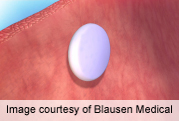Lisdexamfetamine helps lessen excessive food consumption that characterizes binge-eating
THURSDAY, Jan. 15, 2015 (HealthDay News) — At higher doses, the attention-deficit/hyperactivity disorder (ADHD) drug lisdexamfetamine dimesylate (Vyvanse) curtails the excessive food consumption that characterizes binge-eating disorder, preliminary research suggests. The findings were reported online Jan. 14 in JAMA Psychiatry.
James Mitchell, M.D., president of the Neuropsychiatric Research Institute in Fargo, N.D., and colleagues tracked outcomes among 260 patients with moderate to severe binge-eating disorder between 2011 and 2012. All of the participants were between 18 and 55 years old, and none had a diagnosis of any additional psychiatric disorders, such as ADHD, anorexia, or bulimia. The volunteers were divided into four groups for 11 weeks. The first group received 30 mg of lisdexamfetamine daily, while the second and third groups started with 30 mg a day, increasing to 50 or 70 mg (respectively) within three weeks. A fourth group took an inactive placebo pill.
Lisdexamfetamine did not appear to help curtail binge eating at the lowest dosage. But people taking the higher doses experienced a bigger drop in the number of days they binged each week compared with the placebo group, the researchers found. Also, while only about one-fifth (21.3 percent) of those treated with a placebo were able to stay binge-free for a month, that figure increased to 42.2 and 50.0 percent among the 50- and 70-mg drug groups, respectively.
The study authors point out that their investigation remains ongoing, and their findings must be reconfirmed.
The 14-week study was funded by Shire Development, the manufacturer of lisdexamfetamine.
Copyright © 2015 HealthDay. All rights reserved.








